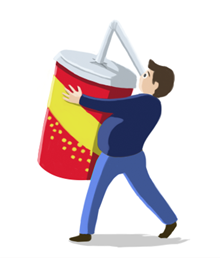In an attempt to reverse the obesity epidemic, lawmakers and health officials across the nation are considering new laws and taxes.
Legislation in California calls for the nation’s first warning labels on sugary drinks. A soda tax is being debated in Illinois, and New York City’s 2012 efforts to ban large sodas is now before the state’s highest court. Meanwhile, a tax on sugar-sweetened drinks was enacted in Mexico, which has the world’s highest death rates from sugary drinks.
Americans drink about 45 gallons of sugary beverages a year, a veritable bathtub full of products linked to health problems, including obesity, heart disease, high blood pressure and diabetes.
“Sugar-sweetened beverages are the No. 1 source of added sugar in American diets,” said Dr. Goutham Rao, chairman of the American Heart Association’s Obesity Committee, vice chair of the department of family medicine at the University of Chicago and associate director of the Center for Clinical Research Informatics of the NorthShore University Health System. “While obesity is complex and has many causes, discouraging sugar-sweetened beverage consumption is a simple, single behavior that can have a positive impact.”
The American Heart Association supports taxes, based on the scientific evidence about the health issues related to sugary drinks. Adults who down a sugary soda a day increase their likelihood of being overweight by 27 percent. Kids with the same habit more than double their risk to 55 percent. Research shows that a soda or two a day increases the risk of diabetes by 26 percent. Worldwide, sugary drinks are linked to more than 180,000 obesity-related deaths each year.
Despite those figures, efforts to do something about it have struggled. More than 30 states and cities have tried to pass soda taxes without success in recent years.
But in California, Democratic state Sen. Bill Monning, who introduced the bill in the nation’s most populated state, said lawmakers have a responsibility to protect citizens. “As with tobacco and alcohol warnings, this legislation will give Californians essential information they need to make healthier choices,” he said when introducing the bill earlier this month.
The measure would place a warning on drink containers with added sweeteners that have 75 or more calories per 12 ounces. The warning, developed by nutrition experts, reads: “STATE OF CALIFORNIA SAFETY WARNING: Drinking beverages with added sugar(s) contributes to obesity, diabetes, and tooth decay.”
In Illinois, a case of soda could get a $2.88 price hike if the Healthy Eating and Active Living Act passes. The legislation, introduced Feb. 19, would add a penny-per-ounce excise tax on sugar-sweetened beverages sold in sealed containers and be the first of its kind in the country.
The Illinois Alliance to Prevent Obesity predicts that the tax would reduce obesity in kids by 9.3 percent and adults by 5.2 percent, and save more than $150 million in obesity-related health care costs in a year. Similar taxes on tobacco were found to be effective in reducing smoking.
John Sicher, editor and publisher of the trade publication Beverage Digest, said the obesity problem in America is undeniable, but that sweetened beverages are getting too much of the blame. He also was critical of the measures proposed in California and Illinois, saying they won’t work or are unfair.
“Anybody who denies there is an obesity crisis in America has their heads deeply in the sand and the beverage industry does not deny that,” he said. “What I believe is that some of the proposed solutions are unfair to people with lesser means and are not going be effective.”
Soda taxes are regressive and would disproportionately affect lower-income people, he said. Sicher also said the California effort to add warning labels would really add nothing because the ingredients are already on the labels.
Regardless of whether these measures pass, from a public-health standpoint it’s crucial that everyone understands the harm these beverages can have.
Bridget Williams, a Chicago-area registered nurse and an American Heart Association volunteer, is the mother of two teenage boys who knows it can be tough to keep the treats out of the grocery cart.
“We all know that is difficult in a culture of fast food and sugar-sweetened beverage consumption,” she said. “But we can no longer ignore the devastating effects obesity has on a person’s life from healthcare and quality-of-life perspectives.”
For more information:
Voices for Healthy Kids
Sugar-sweetened beverage tax policy brief
Source: American Heart Association, Soda debate bubbling across the country

